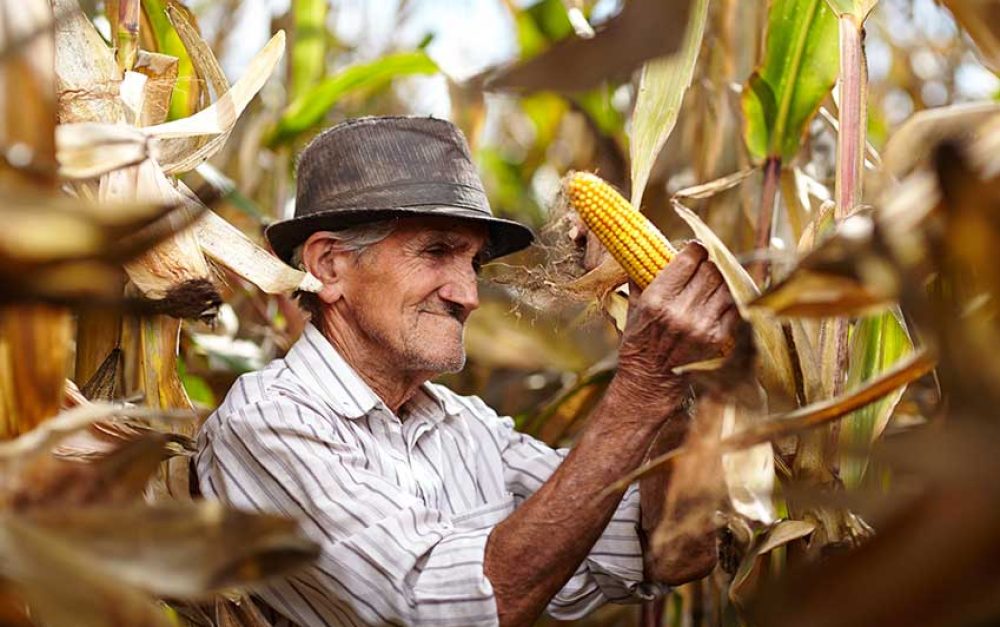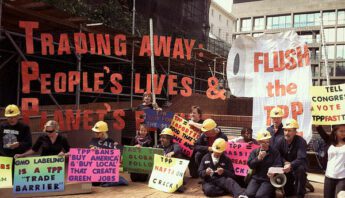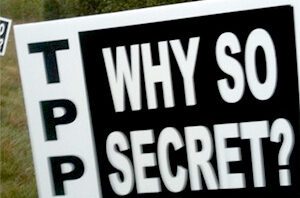On February 4, the Trans-Pacific Partnership (TPP) was signed by 12 countries in North America, South America and Asia. Now each country’s congress is considering whether or not to ratify this global trade agreement. All eyes are on the United States, where free trade has become a key election issue.
The deal was negotiated in secret with 600 corporate advisors; anyone who did read it faced a gag rule. When the text was finally released it became clear that across the board, the deal put profit before people — with disturbing implications for farmers, rural communities and the poor, in the U.S. and around the world.
In his encyclical Laudato Si, Pope Francis reminds us to hear the cry of the Earth and the cry of the poor. He warns of a development model that leads to further corporate concentration, an erosion of traditional cultures, greater income inequality and environmental degradation.
The Maryknoll missioners our office supports serve in Asia, Africa and Latin America, and witness the impacts of the free trade model of development first-hand. Below are some of the lessons we‘ve learned about impacts of past trade agreements on smallholder farmers, public health and rural communities.
Corporate concentration of farming
After the passage of both the North American Free Trade Agreement (NAFTA) and the Central America Free Trade Agreement (CAFTA), many subsistence farmers could no longer afford to farm.
Roughly two million farmers lost their livelihoods due to the import of subsidized corn flowing to Mexico, the price of genetically engineered (GE) seeds, mechanization and land grabbing for large-scale production. Many were forced to migrate or transition to factory jobs with poor working conditions. The TPP will expand some of the worst features of NAFTA and corporate agriculture policy.
In addition, the TPP requires countries to ratify the International Convention for the Protection of New Varieties of Plants 1991 (UPOV-91), an international treaty protecting plant breeders. UPOV-91 stops farmers and breeders from exchanging protected seeds, a common practice of farmers in many countries around the world.
Local economies undermined
El Salvador’s Family Agriculture Plan (PAF) relies on a government procured seed distribution program to help smallholder farmers attain food sovereignty. In 2013 El Salvador opened up the bidding process for domestic small-scale seed producers that produced local varieties. These seeds relied less on chemical fertilizers than imported GE seeds, and were naturally drought resistant to help farmers adapt to climate change.
That year, 100 percent of the corn seeds came from local, small-scale producers — creating jobs, lowering the cost of the program and providing seed to more family farmers.
But when the Millennium Challenge Corporation (MCC) renewed PAF funding in 2014, they threatened to withhold the funds and file a CAFTA lawsuit if El Salvador did not accept U.S. seed company bids. Not coincidentally, the U.S. Trade Representative has a seat on the MCC board. In 2015 the Salvadoran government reverted to its old bidding model.
Investor interests trump all
In many countries, indigenous communities with collective land rights have the legal right to prior and informed consent before a project begins on their land. But corporations and governments rarely comply, and communities lose their land and livelihoods, effectively destroying local cultures, ecosystems and rural economies.
Under trade agreements like TPP, corporations can sue governments for lost profits when communities protest a project or product that threatens their human dignity, or when new laws prevent an investment from advancing — such as a mine, a large-scale farm or even the sale of an expensive, patent-protected medication. These corporate lawsuits move forward in private courts outside of domestic or international law.
For examplke, El Salvador is currently facing a CAFTA suit from Oceana Gold for $301 million after communities successfully protested proposed gold mining, and the government declared a mining moratorium for fear the project would contaminate the largest source of drinking water for the country.
While El Salvador and Costa Rica have declared mining moratoriums, trade agreements have prompted Honduras, Guatemala and Peru to protect global investor interests with forced displacement of marginalized communities, laws criminalizing protest — and violence. Recent unsolved murders of environmental human rights defenders include Berta Caceres and Nelson Garcia in Honduras, Walter Mendez and Rigoberto Lima Choc in Guatemala and Hitler Rojas in Peru.
The TPP, if ratified, will expand upon many of the challenges rural, impoverished communities already face today due to free trade agreements. What we need is a trade policy that promotes the development of local economies to lift all people out of poverty in a dignified way.
What we don’t need is another broken free trade agreement.







